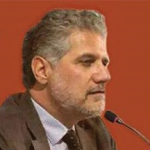This paper investigates the role of political institutions and interests in shaping monetary policy in the resource-rich Arab economies. The paper first reviews the literature on the political economy of monetary policy, central banking and exchange rates. The paper then studies these determinants in Arab economies differentiating between populous (or labor abundant) economies and non-populous (or labor scarce) economies. Political-economic determinants of monetary policy such as sectoral groups’ interest/preferences, rentier state, governance and the need to attract international capital inflows are considered.

Authors
Ghassan Dibeh
Professor of Economics and the Chair, Department...


